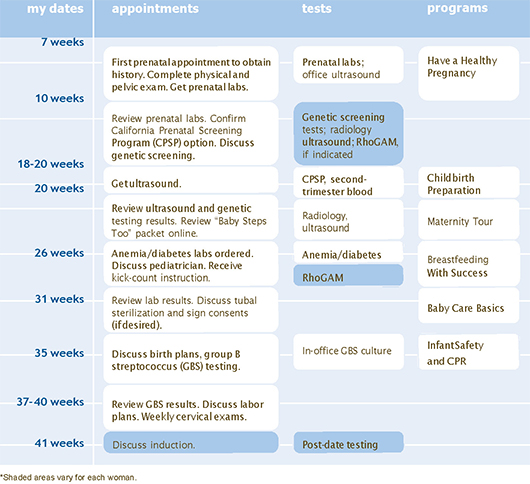
Going forward, any COVID-19 vaccine recommended by ACIP, including updated boosters, will continue to be fully covered for people enrolled in non-grandfathered plans starting 15 days after the vaccine is recommended by ACIP, irrespective of whether the vaccine is under an emergency use authorization or fully approved by the FDA.
Kaiser well baby visits schedule full#
With regard to the COVID-19 vaccine, Congress waived the typical one year delay in implementation and required private insurance plans to begin full coverage 15 days after ACIP recommendation. The preventive services guidelines require coverage for adults and children and include immunizations such as influenza, meningitis, tetanus, HPV, hepatitis A and B, measles, mumps, rubella, varicella, and COVID-19. A new ACIP recommendation is considered to be issued on the date that it is adopted by the Director of the CDC. Health plans must also provide coverage without cost-sharing for immunizations that are recommended and determined to be for routine use by the ACIP, a federal committee comprised of immunization experts that is convened by the Centers for Disease Control and Prevention (CDC). The effective date for a new recommendation from USPSTF is considered to be the last day of the month in which it is published or otherwise released.

The services required to be covered without cost-sharing include screenings for depression, diabetes, obesity, various cancers, and sexually transmitted infections (STIs), prenatal tests, medications that can help prevent HIV, breast cancer, and heart disease, as well as counseling for drug and tobacco use, healthy eating, and other common health concerns. An “A” or “B” letter grade indicates that the panel finds there is high certainty that the services have a substantial or moderate net health benefit. Insurers must cover evidence-based services for adults that have a rating of “A” or “B” in the current recommendations of USPSTF, an independent panel of clinicians and scientists commissioned by the federal Agency for Healthcare Research and Quality. The ACA requires private plans to cover the following four broad categories of services for adults and children (summarized in Tables 1 and 2): I. Clinical Preventive Services for Adults and Children Individual and small group plans in the health insurance marketplaces are also required to cover an essential health benefit (EHB) package-that includes the full range of preventive requirements described in this fact sheet. Preventive Services Task Force (USPSTF), the Advisory Committee on Immunization Practices (ACIP), the Health Resources and Services Administration’s (HRSA’s) Bright Futures Project, and the HRSA-sponsored Women’s Preventive Services Initiative (WPSI). The required preventive services come from recommendations issued by four expert medical and scientific bodies-the U.S. The requirements also apply to the Medicaid expansion eligibility pathway.

In 2019, 13% of workers covered in employer sponsored plans were still in grandfathered plans. 1 These requirements apply to all private plans-fully insured and self-insured plans in the individual, small group, and large group markets, except those that maintain “grandfathered” status. Under Section 2713 of the ACA, private health plans must provide coverage for a range of recommended preventive services and may not impose cost-sharing (such as copayments, deductibles, or co-insurance) on patients receiving these services.

ACA Requirements for Coverage of Preventive Services This fact sheet summarizes the federal requirements for coverage for preventive services in private plans, major updates to the requirement, and recent policy activities on this front. There have also been legal challenges over elements of the preventive services requirement, including in the pending case, Braidwood Management Inc. Since the preventive services coverage policy went into effect, there have been numerous additions, changes, and updates to the policy as well as specific recommendations. Research has shown that evidence-based preventive services can save lives and improve health by identifying illnesses earlier, managing them more effectively, and treating them before they develop into more complicated, debilitating conditions, and that some services are also cost-effective. It has been more than ten years since the Affordable Care Act (ACA) required private insurance plans to cover recommended preventive services without any patient cost-sharing. Note: This content has been updated to incorporate new developments in the case.


 0 kommentar(er)
0 kommentar(er)
